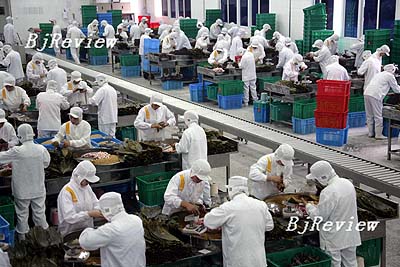|

Better Days for Toys
Customs authorities in Guangdong Province, a major base for the toy-making industry in south China, said demand for exported toys has rebounded despite a spate of recall dramas earlier this year.
Latest statistics obtained from the Huangpu Customs show that the value of toys exported by Guangdong slipped by 5.4 percent in September compared to the same period last year, but it regained strength to register a year-on-year increase of 27.6 percent in October.
Customs analysts said the rebound was spurred by rising demands in the Christmas shopping season, and it also shows that toy recalls, staged by the U.S. toy maker, Mattel Inc. since last summer over lead-contaminated surface paint, proved to have had a limited impact on the province's toy exports.
Mattel apologized to China in September, saying that 87 percent of the recalled toys were found to have loose magnets-a design defect from Mattel itself-while 13 percent contained excessive lead.
China is the world's biggest toy exporter. In 2006, it sold 22 billion sets of toys overseas, about 60 percent of the globe's total.
More Oil Imported
China Petroleum and Chemical Corp. (Sinopec), one of the country's oil giants, had imported another 80,000 tons of diesel oil by the end of November to help guarantee domestic supplies.
The fuel arrived in two cargoes, one going to the southern province of Guangdong and the other to the eastern province of Zhejiang.
The company has imported 383,000 tons of refined products, including 90,000 tons of gasoline and 298,000 tons of diesel oil, since September.
Sinopec will import another 316,000 tons of refined oil in December to ease domestic shortages. The company said it was also likely to purchase stockpiles from private domestic companies at international prices.
The government has ordered oil companies to increase production and imports to avoid emergency fuel shortages.
Foreign Drug Maker Comes
The flu vaccine plant to be built in Shenzhen, Guangdong Province, agreed in a deal signed on November 26 between China and France's Sanofi-Aventis Group, will be the largest investment ever by a foreign drug maker in China.
The 700-million-yuan ($95.5 million) plant will be built at the National Biological Industrial Base in Shenzhen's Longgang Grand Industrial Zone.
The factory, to be run by Sanofi-Pasteur, the vaccine division of Europe's largest pharmaceuticals company Sanofi-Aventis, is expected to commence in early 2008. It will produce 25 million doses annually once production begins in 2012. By then, Shenzhen is expected to become China's-even Asia's-biggest vaccine-manufacturing base.
The agreement was one of several business deals signed on November 26 in the presence of Chinese President Hu Jintao and visiting French President Nicolas Sarkozy.
"The investment is also a milestone in the history of Shenzhen's biological industry development," said Shenzhen Mayor Xu Zongheng. "This new facility will make it possible for the firm to produce pandemic influenza vaccine in China in the event of a human influenza pandemic." | 